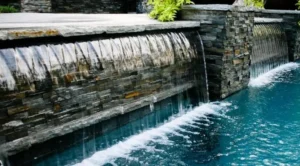44
Water Chemistry 101

Now that cooler weather has set in, most pools aren’t being used. Many pool owners tend to put pool water chemistry on the back burner. However the it is critical to keep the water balanced all year long to reduce water clarity problems, control algae and bacteria growth, and maintain overall condition of the surface of the pool and its equipment. Below are the ideal test ranges:
- pH – 7.4-7.6
- Total Alkalinity – 80-120ppm
- Calcium Hardness – 200-400ppm
- Chlorine – 2-4ppm
- Cyanuric Acid – 30-90ppm
pH – pH is the measure of how acidic or basic the water is. A low pH can cause corrosion of the pool surface and equipment. A high pH can cause calcium to drop out of solution and build up on the surface of the pool. We call that scale and it can make the pool surface rough and unattractive.
Total Alkalinity (TA) – The TA is the pH buffer. If your TA is in range, the pH is less likely to get out of balance.
Calcium Harness (CH) – Your water has a certain appetite for minerals. Without enough CH your water will try to satisfy its own appetite. Which usually means it takes those minerals from the surface of the pool. This causes an etched and rough pool surface. This mostly needs to be worried about when the pool is freshly filled, afterwards the CH levels will only continue to rise.
Chlorine (CL) – Algae and bacteria are a year round problem, so it is important that enough CL is kept in the pool to keep it sanitized. However, it takes much less chlorine in the winter to maintain proper levels compared to the summertime. If you are using a salt system to maintain your CL level, you should be aware that most salt systems do not work when the water temperature drops below 55 degrees. You may have to supplement with granular chlorine to maintain the proper levels.
Cyanuric Acid (CYA) – CYA is sunblock for your chlorine. If your CYA is too low, your chlorine will be easily burned off by sun light. This will cause you to spend more money by having to put more chlorine in the pool. Most tablets and some types of granular chlorine have it built in. If you are using a salt system, it is extremely important that this is tested often.
It is important that all of these are tested at least monthly during the winter. You can do this at home with a test kit or strips or bring a water sample into our store for a free computerized water analysis.




